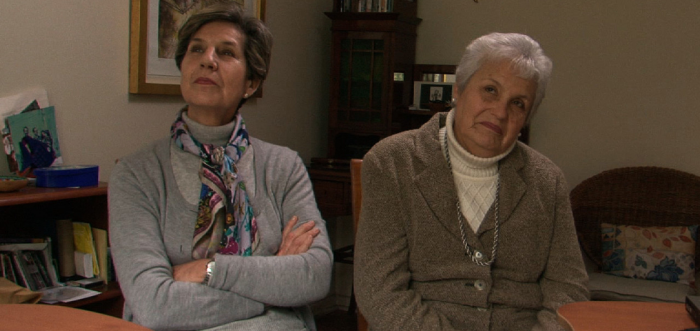
Imagine a documentary on a famous figure, and you normally think of the interviews; a breathless procession of talking heads who know exactly what they want to say and think on them. These experts hand down effusive testimonials, the director ties in a squarely on-the-nose music cue, and the status quo is kept in an inverse to however much the subject disrupted it in their day. This could have easily been the case with Salvador Allende, the Chilean socialist president sworn into office in 1970, who then committed suicide in the face of a military coup and exile to Mexico three years later. Crowds turned out for his funeral and professed to love him like a brother, after all. Yet when it comes to Beyond My Grandfather Allende, a Cannes award-winning documentary1 by his own granddaughter, Marcia Tambutti Allende, the experts—his own surviving family—all place him in a communal blind spot out of grief and emotional irresultion. The film is titled “Allende mi abuelo Allende” in the original Spanish, drawing on the surname’s original double meaning of looking beyond. Rarely is there a more succinct expression of looking forward by looking where you’ve been, nor a more personal kind of exposé.
Further unlike the traditional documentary is how much Marcia rightfully places herself in the investigative process. The obvious comparison is with Stories We Tell, where Sarah Polley investigates her own parentage and burdens herself as much with the past as the blueprint followed to piece it back together. Allende differs by focussing on a very well-known person, with little room for sly gambits and reveals like in Stories, but also by showing the tender exchanges of memory between people. She visits her extended family in calming domestic environs—flats, backyards, living rooms, spaces with years of history—and makes warm inquiries in plain view of the camera, even interviewing Salvador’s 93 year-old widow Hortensia (called “Tencha” by her children) in bed. She is onscreen for almost all of them, and bares her own frustrations and sensitivities as much as her conversational partners. Even the photos of Salvador are filmed in a space that she inhabits, holding a literal magnifying glass aloft.
Problems arise: the deeper she ventures, the more edicts and roadblocks she encounters. They’re casually laid down by family members who don’t want to broach a subject, find themselves bereft of mental stamina, or both. The tactics vary: “Tencha” gives small and weighty anecdotes, but her daughter, Marcia’s aunt, enters and insists that she’s had enough questions for the day. In another locale, Marcia’s own mother gently scolds her for going out of bounds on the questioning they agreed to off-camera. The irony is that “Chico”, as Salvador was affectionately nicknamed, wanted nothing more than to hear them speak—they remember being encouraged as teenagers to participate in discussions that the other adults tried to bar them from. On the other hand, his refusal to ease Marxist convictions, however noble they were, are what led to his exile and demise, which has caused them and the people of Chile such a lack of satisfaction. The tragedy isn’t limited to his truncated life, either, but extends to its repercussions, particularly involving his daughter Tati. The years-long melancholy is palpable, so when Marcia does break through and find some emotional honesty, it makes her every shake of the family tree worth it.
Since Marcia bares her own feelings in these interviews, the film’s true-to-life quality isn’t limited to telling silences and discomforts from the interviewees; a by-now conventional show of skin from documentarians. Another is her deft use of archival materials: not only are black-and-white reels and photos cut elegantly into the narrative, but scenes where she and family members cast their eyes over them bring her historical mission to greater life. By cutting in footage of protests and poring over the spaces where they took place—some restored, some bulldozed, and some only verbally referenced out of respect for the current owners’ wishes—the healing process in Beyond My Grandfather Allende is taken, indeed, beyond personal relationships to a vibrant national scale.
